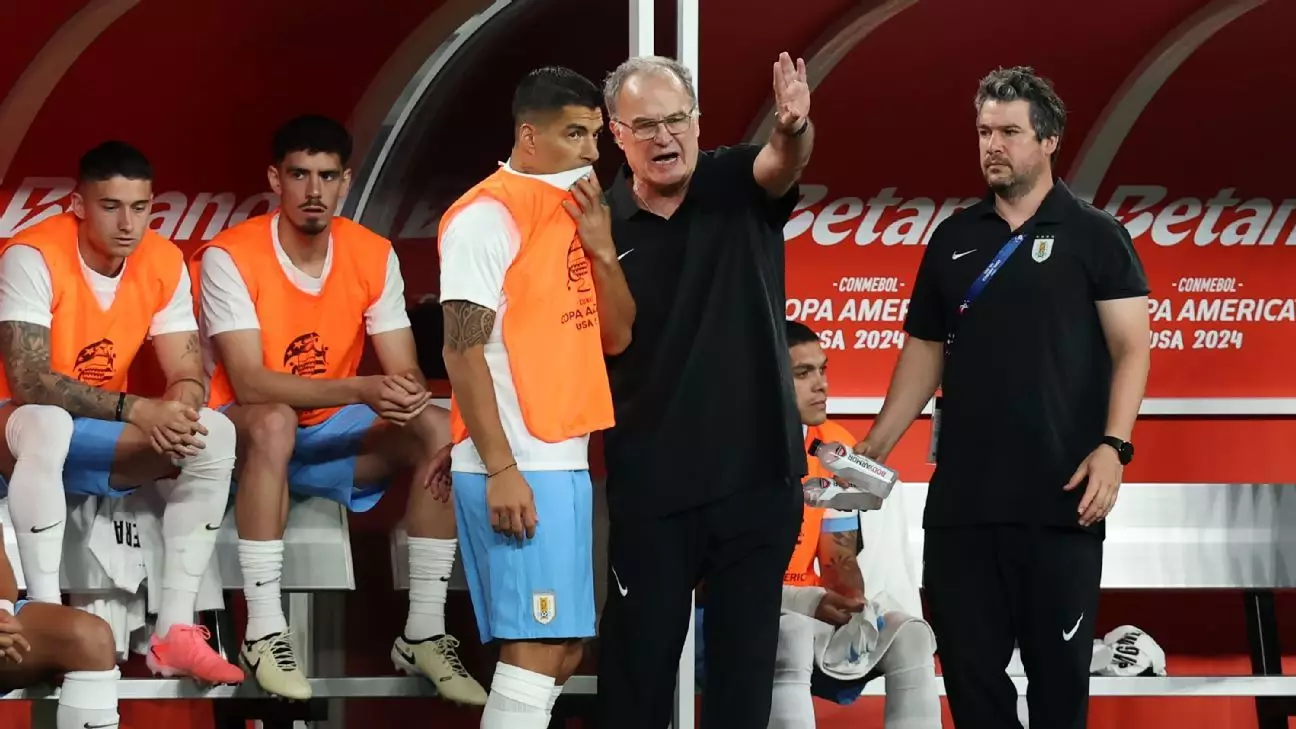Luis Suárez, a seasoned veteran of the Uruguay national team, recently raised serious concerns about the management style of head coach Marcelo Bielsa that surfaced during the 2024 Copa América. Suárez’s remarks reveal a much deeper issue concerning the working environment within the national squad and reflect the challenges that accompany a coaching change at the national team level. Since Bielsa assumed control on May 15, 2023, he has implemented a dramatic reshaping of the team’s operational ethos, one that Suárez classifies as detrimental to team morale and cohesion.
Bielsa has long been admired for his tactical acumen and intense work ethic. However, Suárez’s comments indicate that while Bielsa may bring much to the table from a strategic standpoint, his methods for fostering a collaborative and supportive team atmosphere have come into question. The treatment of staff and the restrictions placed on players blaze a trail toward an oppressive environment rather than one that encourages teamwork and camaraderie.
Suárez’s statements particularly highlight troubling protocols regarding player interactions with staff. According to Suárez, personnel at the Celeste Complex have been barred from engaging openly with players or joining them during meals—a practice that may seem trivial but holds significant implications for team unity. By imposing such rules, Bielsa risks alienating the very individuals who are essential to creating a favorable training environment. Suárez fears this isolation extends beyond game day, significantly impacting morale and teamwork.
Moreover, Suárez noted that players felt compelled to formally request basic acknowledgment from Bielsa, who allegedly refrained from greeting them. This lack of communication is symptomatic of a broader disconnect within the team—a failure to create a welcoming atmosphere for athletes who previously thrived in a more egalitarian setting.
Despite achieving a commendable third-place finish in the Copa América, Suárez has painted a troubling picture of what transpired behind the scenes. The tournament illustrated a façade of success that belied deeper issues lurking under the surface. Suárez conveyed emotional turmoil over events that transpired during the competition; incidents he chose to suppress for the sake of team harmony.
As we consider the outcomes of the tournament, the true measure of success goes beyond mere statistics. Although the Uruguayan team demonstrated resilience, with an unforgettable match against Canada ultimately culminating in a penalty shootout victory, one must ponder the costs associated with that success. The sentiment expressed by Suárez serves as a critical reminder that results can come at the expense of well-being and connection—elements that are essential to any sport’s integrity.
Looking forward to the 2026 World Cup, Suárez has asked fans to exercise patience and empathy toward the players, urging supporters not to vent frustrations at the athletes should challenges arise. He advocates for a united front, emphasizing that Bielsa’s approach might lead to future setbacks due to its divisive nature.
Uruguay’s current position in the Conmebol rankings may seem promising, but Suárez insists that appearances can be deceiving. The focus remains on improving relationships both on and off the pitch. With Bielsa’s tactics appearing to isolate players—even in their training sessions—the cohesive spirit that once defined the team risks becoming extinguished amid the relentless pursuit of perfection.
In summation, while Marcelo Bielsa brings a wealth of knowledge and experience to the Uruguay national team, the revelation of problematic working conditions as shared by Luis Suárez casts a shadow on the leadership style of the iconic coach. As the team approaches vital upcoming matches, including their qualifier against Peru on October 11, the importance of camaraderie and open communication will be critical in navigating the uncertain waters ahead. The ability to balance high expectations with a nurturing environment will ultimately determine not just the present successes of La Celeste but also its future trajectory in international football.

